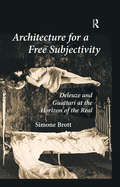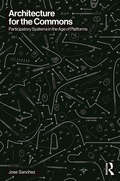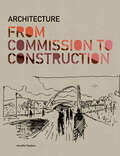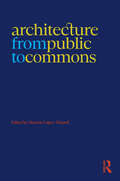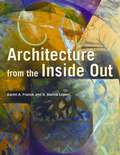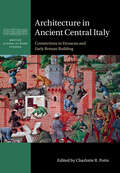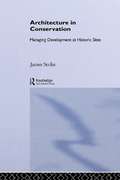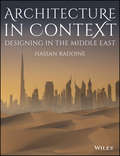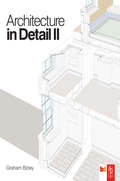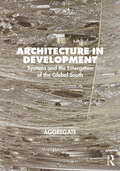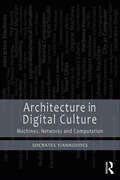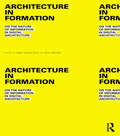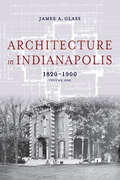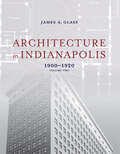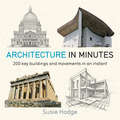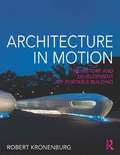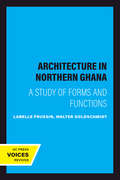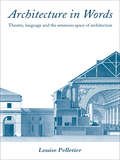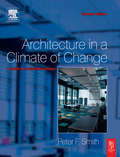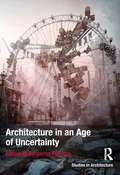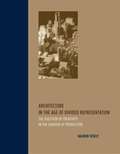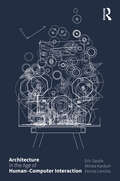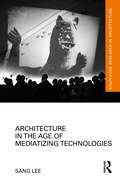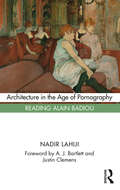- Table View
- List View
Architecture for a Free Subjectivity: Deleuze and Guattari at the Horizon of the Real
by Simone BrottArchitecture for a Free Subjectivity reformulates the French philosopher Gilles Deleuze's model of subjectivity for architecture, by surveying the prolific effects of architectural encounter, and the spaces that figure in them. For Deleuze and his Lacanian collaborator Félix Guattari, subjectivity does not refer to a person, but to the potential for and event of matter becoming subject, and the myriad ways for this to take place. By extension, this book theorizes architecture as a self-actuating or creative agency for the liberation of purely "impersonal effects." Imagine a chemical reaction, a riot in the banlieues, indeed a walk through a city. Simone Brott declares that the architectural object does not merely take part in the production of subjectivity, but that it constitutes its own. This book is to date the only attempt to develop Deleuze's philosophy of subjectivity in singularly architectural terms. Through a screening of modern and postmodern, American and European works, this provocative volume draws the reader into a close encounter with architectural interiors, film scenes, and other arrangements, while interrogating the discourses of subjectivity surrounding them, and the evacuation of the subject in the contemporary discussion. The impersonal effects of architecture radically changes the methodology, just as it reimagines architectural subjectivity for the twenty-first century.
Architecture for the Commons: Participatory Systems in the Age of Platforms
by Jose SanchezArchitecture for the Commons dives into an analysis of how the tectonics of a building is fundamentally linked to the economic organizations that allow them to exist. By tracing the origins and promises of current technological practices in design, the book provides an alternative path, one that reconsiders the means of achieving complexity through combinatorial strategies. This move requires reconsidering serial production with crowdsourcing and user content in mind. The ideas presented will be explored through the design research developed within Plethora Project, a design practice that explores the use of video game interfaces as a mechanism for participation and user design. The research work presented throughout the book seeks to align with a larger project that is currently taking place in many different fields: The Construction of the Commons. By developing both the ideological and physical infrastructure, the project of the Commons has become an antidote to current economic practices that perpetuate inequality. The mechanisms of the production and governance of the Commons are discussed, inviting the reader to get involved and participate in the discussion. The current political and economic landscape calls for a reformulation of our current economic practices and alternative value systems that challenge the current market monopolies. This book will be of great interest not only to architects and designers studying the impact of digital technologies in the field of design but also to researchers studying novel techniques for social participation and cooperating of communities through digital networks. The book connects principles of architecture, economics and social sciences to provide alternatives to the current production trends.
Architecture from Commission to Construction
by Jennifer HudsonThis book provides an in-depth study of the design and construction processes behind 25 leading contemporary buildings. Covering a broad range of international projects, the book illustrates the working methods and creative concerns of both long-established and emerging international architects. Every stage of each project is included, from the demands of the original brief, through early sketches and design development to investigation of building regulations and collaboration with engineers, contractors, builders and clients. Each project is presented through an explanatory overview, sketches, details, CAD renderings, models and construction shots, all captioned in great technical detail. Architecture from Commission to Construction offers both students and professional architects an inspiring and informative overview of how today's major architectural projects are designed and built.
Architecture from Commission to Construction: From Commission To Construction
by Jennifer HudsonThis book provides an in-depth study of the design and construction processes behind 25 leading contemporary buildings. Covering a broad range of international projects, the book illustrates the working methods and creative concerns of both long-established and emerging international architects. Every stage of each project is included, from the demands of the original brief, through early sketches and design development to investigation of building regulations and collaboration with engineers, contractors, builders and clients. Each project is presented through an explanatory overview, sketches, details, CAD renderings, models and construction shots, all captioned in great technical detail. Architecture from Commission to Construction offers both students and professional architects an inspiring and informative overview of how today's major architectural projects are designed and built.
Architecture from Public to Commons
by Marcelo López-DinardiThis book provides an urgent framework and collective reflection on understanding ways to reconsider and recast architecture within ideas and politics of the commons and practices of commoning. Architecture from Public to Commons opens with Institutions the dialogue with the scales of the commons, the limits of language for fluid identities, the practices and challenges of architecture as an institution, the design of objects with apparent shared value in Chile, land protocols that explore alternatives to profit-seeking of property in New York, and spirited conversations about revolting against architectural labor from Latin America. Continuing chapters explore, under Territories, the boundaries of Blackness across the Atlantic between Ethiopia and Atlanta, the underground woven network with conflicting grounds of ipê wood between Brazil and the US, water cycles in depleted territories in Chile, indigenous women-led territorial and human rights struggles in Guatemala, climate change accidental commons in California, and the active search for racial justice between design and place in New Orleans. Contributions range from theoretical and historical essays to current case studies of on-the-ground practices in the US, the Middle East, Europe, and Central and South America. Bringing together architects, scholars, artists, historians, sociologists, curators, and activists, this book instils an urgent framework and renewed set of tools to pivot from architecture’s traditional public to a politicized commons. It will greatly interest students, academics, and researchers in architecture, urban design, architectural theory, landscape architecture, political economy, and sociology.
Architecture from the Inside Out: From the Body, the Senses, the Site, and the Community
by Karen A. Franck R. Bianca LeporiIntroducing a basis for design that transcends fixed notions of style and emerging technologies, this book emphasizes feeling, moving and the experiential. Since the book's initial publication in 2000, architects and writers have been drawn to a more sensory approach to architecture. But there is still a need to encourage and to illustrate the pursuit of design, not as a project, imposing preconceived ideas upon a situation, but as a process evolving from the inside - from movement, sensation, surroundings and a dialogue between architect and client. The authors describe such an approach that places human life, experience and materiality at the centre of design and that seeks out opportunities for discovery, growth and transformation. Karen A. Franck is an environmental psychologist who has taught for many years in the New Jersey School of Architecture. R. Bianca Lepori is a practicing architect in Italy with many years of experience in designing houses and maternity health care facilities.
Architecture in Ancient Central Italy: Connections in Etruscan and Early Roman Building (British School at Rome Studies)
by Charlotte R. PottsArchitecture in Ancient Central Italy takes studies of individual elements and sites as a starting point to reconstruct a much larger picture of architecture in western central Italy as an industry, and to position the result in space (in the Mediterranean world and beyond) and time (from the second millennium BC to Late Antiquity). This volume demonstrates that buildings in pre-Roman Italy have close connections with Bronze Age and Roman architecture, with practices in local and distant societies, and with the natural world and the cosmos. It also argues that buildings serve as windows into the minds and lives of those who made and used them, revealing the concerns and character of communities in early Etruria, Rome, and Latium. Architecture consequently emerges as a valuable historical source, and moreover a part of life that shaped society as much as reflected it.
Architecture in Conservation: Managing Development at Historic Sites (Heritage: Care-preservation-management Ser.)
by James StrikeOne of the problems faced by heritage organizations and museums is adapting old buildings to their needs or building new ones to fit in with historic sites. How exactly do you create a visitor's centre at Stonehenge? The real difficulty lies where the budget is minimal, and the potential damage to the environment or setting enormous. Architecture i
Architecture in Context: Designing in the Middle East
by Hassan RadoineArchitecture in Context: Designing in the Middle East provides a foundation for understanding the critical context of architecture and design in this region. It does this by: presenting a practical overview of architectural know-how in the Middle East, and its potential for cultivating a sense of place introducing local architectural vocabularies and styles, and how they can still be reactivated in contemporary design exploring the cultural and contextual meaning of forms as references that may influence contemporary architecture discussing important discourses and trends in architecture that allow a rethinking of the current global/local dichotomy. Highly illustrated, the book covers architecture and design in North Africa, the Levant, the Gulf, and Turkey, Iran and Iraq.
Architecture in Detail II
by Graham BizleyFollowing on from Graham Bizley’s successful Architecture in Detail, Architecture in Detail II presents 40 case studies of detailing on recent construction projects. Over 150 full colour drawings and photos provide a reference compendium for the professional architect seeking detailing inspiration. Originally featured in Building Design’s In Detail magazine, the included projects represent some of the most interesting and innovative techniques in recent architecture. Graham Bizley’s beautifully presented detail drawings allow the architect to easily see how ideas and techniques can be applied to other projects. The book is organised by building type for quick and easy reference.
Architecture in Development: Systems and the Emergence of the Global South
by AggregateThis extensive text investigates how architects, planners, and other related experts responded to the contexts and discourses of “development” after World War II. Development theory did not manifest itself in tracts of economic and political theory alone. It manifested itself in every sphere of expression where economic predicaments might be seen to impinge on cultural factors. Architecture appears in development discourse as a terrain between culture and economics, in that practitioners took on the mantle of modernist expression while also acquiring government contracts and immersing themselves in bureaucratic processes. This book considers how, for a brief period, architects, planners, structural engineers, and various practitioners of the built environment employed themselves in designing all the intimate spheres of life, but from a consolidated space of expertise. Seen in these terms, development was, to cite Arturo Escobar, an immense design project itself, one that requires radical disassembly and rethinking beyond the umbrella terms of “global modernism” and “colonial modernities,” which risk erasing the sinews of conflict encountered in globalizing and modernizing architecture. Encompassing countries as diverse as Israel, Ghana, Greece, Belgium, France, India, Mexico, the United States, Venezuela, the Philippines, South Korea, Sierra Leone, Singapore, Turkey, Cyprus, Iraq, Zambia, and Canada, the set of essays in this book cannot be considered exhaustive, nor a “field guide” in the traditional sense. Instead, it offers theoretical reflections “from the field,” based on extensive archival research. This book sets out to examine the arrays of power, resources, technologies, networking, and knowledge that cluster around the term "development," and the manner in which architects and planners negotiated these thickets in their multiple capacities—as knowledge experts, as technicians, as negotiators, and as occasional authorities on settlements, space, domesticity, education, health, and every other field where arguments for development were made.
Architecture in Digital Culture: Machines, Networks and Computation
by Socrates YiannoudesThis book examines the manifestations of architecture, cities, and design processes within digital culture. Adopting a comparative and critical method, the author looks at past and present encounters of the digital with architectural discourse and practice. Along three central themes – machines, networks, and computation – the book begins by discussing transformations of the analogy between architecture and the machine since the early twentieth century, foregrounding questions about the relations between architecture, humans, machines, and the environment. It moves on to the city, to observe how big data and smart city sustainable management systems have transformed historical visions of global networked cities. Lastly, it explores computational design thinking historically and in the context of complex systems, as well as the latest technical, social, and economic developments. Exposing possible drawbacks while still focusing on what is radically innovative, this book proposes a way toward more liberating, digital, and sustainable futures for architecture. An important read for architecture students, academics, and professionals, this book connects instances of digital architecture practice and discourse throughout the history of the digital culture paradigm and their ties with sociopolitical developments. It shares the possibility that these connecting lines may be the canvas for a novel architectural history of the recent past.
Architecture in Formation: On the Nature of Information in Digital Architecture
by Aaron Sprecher Pablo Lorenzo-EiroaArchitecture in Formation is the first digital architecture manual that bridges multiple relationships between theory and practice, proposing a vital resource to structure the upcoming second digital revolution. Sixteen essays from practitioners, historians and theorists look at how information processing informs and is informed by architecture. Twenty-nine experimental projects propose radical means to inform the new upcoming digital architecture. Featuring essays by: Pablo Lorenzo-Eiroa, Aaron Sprecher, Georges Teyssot, Mario Carpo, Patrik Schumacher, Bernard Cache, Mark Linder, David Theodore, Evan Douglis, Ingeborg Rocker and Christian Lange, Antoine Picon, Michael Wen-Sen Su, Chris Perry, Alexis Meier, Achim Menges and Martin Bressani. Interviews with: George Legendre, Alessandra Ponte, Karl Chu, CiroNajle, and Greg Lynn. Projects by: Diller Scofidio and Renfro; Mark Burry; Yehuda Kalay; Omar Khan; Jason Kelly Johnson, Future Cities Lab; Alejandro Zaera-Polo and Maider Llaguno Munitxa; Anna Dyson / Bess Krietemeyer, Peter Stark, Center for Architecture, Science and Ecology (CASE); Philippe Rahm; Lydia Kallipoliti and Alexandros Tsamis; Neeraj Bhatia, Infranet Lab; Jenny Sabin, Lab Studio; Luc Courschene, Society for Arts and Technology (SAT); Eisenman Architects; Preston Scott Cohen; Eiroa Architects; Michael Hansmeyer; Open Source Architecture; Andrew Saunders; Nader Tehrani, Office dA; Satoru Sugihara, ATLV and Thom Mayne, Morphosis; Reiser and Umemoto; Roland Snooks, Kokkugia; Philip Beesley; Matias del Campo and Sandra Manninger SPAN; Michael Young; Eric Goldemberg, Monad Studio; Francois Roche; Ruy Klein; Chandler Ahrens and John Carpenter.
Architecture in Indianapolis: 1820–1900
by James A. GlassAs a planned community, Indianapolis boasted finished frame and brick buildings from its beginning. Architects and builders drew on Federal, Greek Revival, Italianate, French Second Empire, Gothic, Romanesque, and Italian Renaissance styles for commercial, industrial, public, and religious buildings and for residences.In Architecture in Indianapolis: 1820–1900, preservationist and architectural historian Dr. James Glass explores the rich variety of architecture that appeared during the city's first 80 years, to 1900. Glass explains how economic forces shaped building cycles, such as the Canal Era, the advent of railroads, the natural gas boom, and repeated recessions and recoveries. He describes 243 buildings that illustrate the styles that architects and builders incorporated into the designs that they devised in each era between 1820 and 1900. This book also documents the loss of distinctive 19th century architecture that has occurred in Indianapolis. It includes 373 photographs and drawings that depict the buildings described and locator maps that show where concentrations of buildings were constructed. Architecture in Indianapolis: 1820–1900 provides the first history of 19th-century architecture in the city and will serve as an indispensable reference for decades to come.
Architecture in Indianapolis: 1900–1920
by James A. GlassAs the twentieth century began, Indianapolis found itself at the center of a booming commercial and industrial network with new office buildings, department stores, theaters, hotels, factories, places or worship, and the largest electric interurban train network in the nation. The population was growing, as well, with many new residential additions to the city planned, from ornate mansions on the north side of the city to working-class bungalows and apartments.In Architecture in Indianapolis: 1900-1920, preservationist and architectural historian Dr. James A. Glass describes the varied architectural currents that shaped buildings in Indianapolis during the first two decades of the twentieth century, a period when the Commercial Club of Indianapolis called the state capital "the largest inland city." With over 300 photographs and drawings, as well as 31 maps, Glass continues the exploration begun in Volume 1 of the variety of architectural styles that the city's builders drew on, including Italian Renaissance, Gothic, Arts and Crafts, Modern, Tudor palace and Tudor vernacular, Prairie Style, and many more. And, like Volume 1, Volume 2 documents the loss of distinctive architecture that has occurred throughout Indianapolis and explains why certain structures were razed. Both volumes together provide the first history of architecture in the city during its first century and will serve as an indispensable reference for decades to come. Along with its companion 1820-1900, Architecture in Indianapolis: 1900-1920 describes the varied architecture that architects and builders in the city designed and constructed during the first two decades of the twentieth century and profusely illustrates buildings of that period, providing an indispensable reference for decades to come.
Architecture in Minutes (In Minutes)
by Susie HodgeIn this concise and comprehensive guide to the world of architecture, art historian Susie Hodge outlines the history and theory of architecture, from the earliest structures and monuments to the cutting-edge concepts of the present day, and profiles dozens of key buildings and celebrated architects. Topics and concepts include the Greek orders, Roman engineering, Gothic architecture, the Renaissance, the Baroque era, Revivalism, Art Nouveau, Modernism, Futurism, and Dynamic architecture. Every concept is accompanied by an illustration.
Architecture in Motion: The history and development of portable building
by Robert KronenburgThe idea that architecture can be portable is one that grabs the imagination of both designers and the people who use it, perhaps because it so often forecasts a dynamic and creative solution to the complex problems of our contemporary mobile society, while at the same time dealing with issues of practicality, economy and sustainability. Architecture in Motion examines the development of portable, transportable, demountable and temporary architecture from prehistory to the present day. From familiar vernacular models such as the tent, mobile home and houseboat, to ambitious developments in military and construction engineering, all aspects of portable building are considered. Building on his earlier works Portable Architecture and Houses in Motion, Robert Kronenburg compares traditional forms of building, current commercial products and the work of innovative designers, and examines key contemporary portable buildings to reveal surprising, exciting and imaginative examples. He explores the philosophical and technological issues raised by these experimental and futuristic prototypes. By understanding the nature of transitory architecture, a new ecologically aware design strategy can be developed to prioritise buildings that 'tread lightly on the earth' and still convey the sense of identity and community necessary for an established responsible society. This book provides a unique insight into this pivotal field of design.
Architecture in Northern Ghana: A Study of Forms and Functions
by Labelle PrussinThis title is part of UC Press's Voices Revived program, which commemorates University of California Press’s mission to seek out and cultivate the brightest minds and give them voice, reach, and impact. Drawing on a backlist dating to 1893, Voices Revived makes high-quality, peer-reviewed scholarship accessible once again using print-on-demand technology. This title was originally published in 1969.
Architecture in Words: Theatre, Language and the Sensuous Space of Architecture
by Louise PelletierWhat if the house you are about to enter was built with the confessed purpose of seducing you, of creating various sensations destined to touch your soul and make you reflect on who you are? Could architecture have such power? This was the assumption of generations of architects at the beginning of modernity. Exploring the role of theatre and fiction in defining character in architecture, Louise Pelletier examines how architecture developed to express political and social intent. Applying this to the modern day, Pelletier considers how architects can learn from these eighteenth century attitudes in order to restore architecture's communicative dimension. Through an in-depth and interdisciplinary analysis of the beginning of modernity, Louise Pelletier encourages today's architects to consider the political and linguistic implications of their tools. Combining theory, historical studies and research, Architecture in Words will provoke thought and enrich the work of any architect.
Architecture in a Climate of Change
by Peter F SmithRevised to incorporate and reflect changes and advances since it was first published the new edition of Architecture in a Climate of Change provides the latest basic principals of sustainability and the future of sustainable technology.Including new material on wind generation, domestic water conservation, solar thermal electricity as well as international case studies Architecture in a Climate of Change encourages readers to consider new approaches to building making minimum demand on fossil based energy.
Architecture in an Age of Uncertainty (Ashgate Studies In Architecture Ser.)
by Benjamin FlowersIn the past two decades economic bubbles inflated and architectural spending around the globe reached fever pitch. In both well-established centers of capital accumulation and far--flung locales, audacious building projects sprang up, while the skyscraper, heretofore more commonly associated with American capitalism, seemed as if it might pack up and relocate to Dubai and Shanghai. Of course, much has changed in the past couple of years. In formerly free-spending Dubai, the tallest building in the world is now is named after the president of Abu Dhabi after he stepped in with last--minute debt financing. In cities across the United States, housing prices have nose-dived and cleared lots sit ready for commercial redevelopment that likely won't take place for another decade. Similar stories are not hard to find in many other nations. Architecture firms that swelled in flush days are jettisoning employees at a startling rate. In the context of economic instability (and its attendant social and political consequences), this edited volume brings together scholars, critics, and architects to discuss the present state of uncertainty in the practice and discipline of architecture. The chapters are organized into three main areas of inquiry: economics, practice, and technology. Within this larger framework, authors explore issues of security, ecological design, disaster architecture, the future of architectural practice, and the ethical obligations of the social practice of design. In doing so, it argues that this period has actually afforded architecture a valuable moment of self-reflection, where alternative directions for both the theory and practice of architecture might be explored rather than continuing with an approach which was so nurtured by capitalist prosperity and affluence.
Architecture in the Age of Divided Representation: The Question of Creativity in the Shadow of Production
by Dalibor VeselyIn this long-awaited work, Dalibor Vesely proposes an alternative to the narrow vision of contemporary architecture as a discipline that can be treated as an instrument or commodity.
Architecture in the Age of Human–Computer Interaction
by Eric Sauda Alireza Karduni Donna LanclosThis book investigates the spaces where architecture and computer science share a common set of assumptions and goals, using methods and objectives from architecture, ethnography, and human–computer interaction (HCI).Architecture and HCI depend on and borrow from each other, and even share some vocabulary in their divergent disciplinary agendas. The authors here unpack the past, present, and potential futures of architecture and the user interface, employing the lens of ethnography and ethnographic practices to launch this exciting cross-disciplinary inquiry. The goal is the creation of an interface that is able to connect the wide range of embodied architectural space, the modes of interaction afforded by computation, and the social process of creating meaningful places.This will be of great interest to upper-level students and academics in the fields of architecture, human–computer interaction, and ethnography.
Architecture in the Age of Mediatizing Technologies (Routledge Research in Architecture)
by Sang LeeThis book offers a novel perspective on contemporary architecture, exploring its position in mediatization, attained through technological apparatuses. It introduces the novel concepts of apparatus-centricity and mediatization of architecture, which have significant disciplinary and cultural ramifications.Highlighting key technological and theoretical developments, the book’s narrative traces the transformation of architecture from the modernist era to the present, digital age. En route, it reflects on how architecture becomes a crucial element of shifting dispositives through its confluence with technologies of aestheticization and virtualization, and by emblematizing ecological ideals. It also illuminates the reconfiguring of architectural practice through examining surprising interactions and analogies between architecture and music, whose developments in notation and codification continually change the relationship between composer and performer. The book explores how architecture is reshaped by broader theory and practice in media and ultimately serves as a cognitive agent. It underscores that architecture profoundly influences our phantasmagoric, image-driven affective world through its increasingly apparatus-centric approach to conception, design, production, and mediatization.Architecture in the Age of Mediatizing Technologies brings into focus the behavior of architecture in mediatization for researchers and advanced students in architectural design, theory, and history. As an investigation into the interdisciplinary impact of architecture in a mediatized culture at large, it also provides a valuable resource for cultural and media studies.
Architecture in the Age of Pornography: Reading Alain Badiou
by Nadir LahijiArchitecture, and its pedagogy in the academy, is dominated by the technology of image production that veils the ‘naked power’ behind its operation. It conforms to the principles of cultural logic of the society of the spectacle, consistent with neoliberal capitalism. The problem with this dominant pedagogy is that it violates the fundamental ethical imperative, putting architecture in direct contradiction with the ‘common good’. In addition, it has let architecture enter the brothel of pornographic capitalism which turns every object into an object of obscene gratification of the senses. In this book, Nadir Lahiji adopts Alain Badiou’s thesis from The Pornographic Age to demonstrate that contemporary architecture is in absolute complicity with the pornographic present. The traits that Badiou identifies in this age are manifestly visible in architectural surfaces which are subordinated to the same ‘regime of images’. Similarly to Badiou’s political indictments of the society which has given rise to the pornographic present, the book condemns the architecture that has lent its service to the same society with a license to consummate its transgression to better cater to the imperative of the ‘regime of images’. Transposing the conceptual categories in Badiou’s analysis to the critique of architecture’s pornographic turn in contemporary society, the book constructs a conceptual framework by which to demonstrate the specific manifestations of pornography in building. The book is aimed at architecture students at higher graduate and post-graduate levels.
